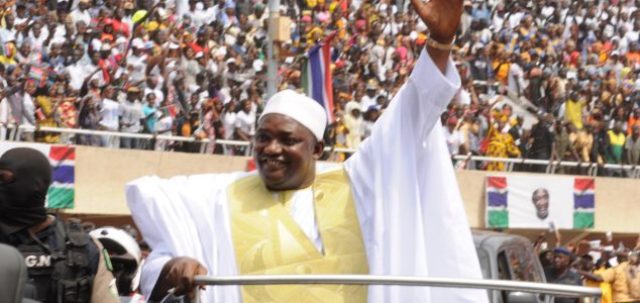 Rejoining the Commonwealth will mark another step in The Gambia's rehabilitation on the world stage under President Adama Barrow [picture: Office of the President]
Rejoining the Commonwealth will mark another step in The Gambia's rehabilitation on the world stage under President Adama Barrow [picture: Office of the President]
On 1 December 2016, Adama Barrow won the fifth Gambian presidential election held since 1996, surprisingly defeating Yahya Jammeh, who had won the previous four contests. A former leader of the United Democratic Party (UDP), the main opposition to Jammeh’s Alliance for Patriotic Reorientation and Construction (APRC) party, the previously little-known Barrow had been elected to head the opposition Coalition in October, but few commentators had expected him to defeat Jammeh.
After a prolonged political crisis brought about by Jammeh initially accepting the result and then reversing his position, Barrow finally returned to Banjul to assume office on 26 January 2017. He did so after the Economic Community of West African States had threatened to remove Jammeh by force if necessary and Senegalese troops had moved to the Gambian border, with Jammeh finally agreeing to go into exile in Equatorial Guinea. Since then Barrow has gradually consolidated his power, appointing his first Coalition Cabinet in February and seeing his former party, the UDP, gain over half the seats (31 out of 53) in the National Assembly election in April. In contrast, the APRC which won only 5 seats (all in the Foni Districts of the West Coast Region), has seen much of its support ebb away since Jammeh’s fall from power.
In one of his first interviews after winning the presidential election in December, Barrow informed The Guardian that The Gambia intended to apply to rejoin the Commonwealth. In October 2013, Jammeh had suddenly announced that the country was leaving the Commonwealth immediately. He then declared that ‘The Gambia will never be a member of any neo-colonial institution and will never be a party to any institution that represents an extension of colonialism’. No notice had been given to Commonwealth officials who were clearly shocked by the decision, which was apparently made without the knowledge of senior members of his government. Exactly why Jammeh acted in this way remains unclear. The most likely explanation is that at a time when relations with both the British and American governments were deteriorating, with the Gambian government resenting external criticism of its very bad human rights record, Jammeh was provoked by demonstrations against him on a visit to New York in September 2013. Subsequently, in October 2016, The Gambia withdrew from another organisation that it viewed as ‘neo-colonial’, the International Criminal Court (ICC); Jammeh’s Minister of Information, Sheriff Bojang, announced on state television that the ICC was ‘in fact an International Caucasian Court for the persecution and humiliation of people of colour, especially Africans’.
The Commonwealth Heads of Government Meeting issued a communiqué in November 2013 which expressed regret at Jammeh’s decision and ‘looked forward to the country’s eventual return’. Not surprisingly, therefore, in February 2017, the Commonwealth Secretariat welcomed The Gambia’s planned return. The British Government is also very keen for The Gambia to regain Commonwealth membership; shortly before an official visit to Banjul in February 2017, the Foreign Secretary, Boris Johnson, announced that it intended to help The Gambia do so ‘in the coming months’.
Benefits of rejoining
President Barrow has not stated publicly why he considers membership of the Commonwealth so important. It is probable, however, that Barrow is seeking to follow the approach of the country’s first president, Sir Dawda Jawara, who pragmatically sought to establish good relations with any country or international organisation that could assist The Gambia’s development. This included the Commonwealth which was able to offer the country a degree of economic and political support. Significantly, Barrow also announced in February that The Gambia intends to recognise the jurisdiction of the ICC. Like Jawara, Barrow appears to value the fact that members of the Commonwealth, regardless of size, all have an equal status; this means that its voice can be heard on an international stage.
Other benefits that were lost when The Gambia withdrew from the Commonwealth will be restored when it regains membership. These include participation in technical assistance programmes (which previously allowed The Gambia to recruit judges from other Commonwealth countries, for example); scholarships for Gambian students; immigration privileges in the United Kingdom, which were withdrawn in November 2015 under The British Nationality (The Gambia) Order 2015, and in some other Commonwealth countries; and participation in the Commonwealth Games and other sporting events.
History of rejoining
It remains unclear whether The Gambia has now submitted a formal application to rejoin the Commonwealth. Assuming that it has done so (or will do so shortly), all current 52 Commonwealth States must formally endorse The Gambia’s application for it to be approved. Only three other Commonwealth members have re-entered the organisation in its history: Pakistan (in 1989), South Africa (in 1994) and Fiji (in 1997). Fiji regained Commonwealth membership at a meeting of the Commonwealth Ministerial Action Group (CMAG) in 1997. It is probable that The Gambia will also do so at the next CMAG meeting in New York in September 2017; it seems very unlikely that any country will oppose the Gambian application.
The Gambia is likely once again to become an active member of the Commonwealth, as it was under Jawara, while rejoining the organisation will mark another step in its rehabilitation on the world stage after the traumas of the Jammeh era.
David Perfect is a Visiting Research Associate at the University of Chester.
Related articles:
The Gambia’s withdrawal from the Commonwealth – Round Table Journal 2014
Commonwealth statement on The Gambia rejoining the Commonwealth – 2017
British Foreign Secretary on The Gambia rejoining the Commonwealth – 2017
BBC World Service: Adama Barrow’s first 100 days
Editor’s note: The election and its aftermath will be discussed in a forthcoming article by Perfect in The Round Table Journal.



